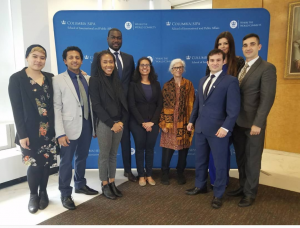The Columbia School of International and Public Affairs (SIPA) capstone team researching on the WFP Centre of Excellence’s South-South cooperation in Western Africa presented the study’s main findings during the 2018 SIPA Workshop in Development.
The team has found that WFP Centre of Excellence’s South-South cooperation encourages the political commitment of Western African countries towards:
– prioritization of school feeding programmes in national policymaking;
– promotion of governmental support for school feeding programmes to reach all stakeholders within the national administration; and
– operationalization of policy frameworks with strategic plans for implementation of sustainable school feeding.

The SIPA workshop team is analysing the WFP Centre’s South-South cooperation methodology in advancing national public policies on food and nutrition security in three countries: Benin, Togo, and Senegal.
As part of this assessment, a group of students participated in a study visit to Brazil on 12-15 March, and another one went to Benin and Togo on 11-16 March. The group visiting Brazil had meetings with representatives of the WFP Centre of Excellence and the Brazilian government, to get familiar with the Centre’s approach and tools and with the Brazilian policies that inspire South-South cooperation efforts.
The group visiting Benin and Togo investigated domestic contextual elements related to the design and implementation of food and nutrition security policies, including legislation, programme design, and financial resources. The research team had meetings with the WFP country offices and representatives of the governments of both countries.
Similar researches have been conducted recently by SIPA capstone with analysis on initiatives by UNDP, UNFPA, UN-HABITAT, UNICEF and UN Women; USAID; the World Bank; several national and local governments; development advisors; and several start-up social enterprises.
Through the workshop, the Columbia academic community could explore the intersection of development concerns with human rights, corporate social responsibility, humanitarian affairs, conflict resolution, education, public health, gender, environmental policy, entrepreneurship and private sector development, and traditional and new media. The team will produce an actionable final report for the WFP Centre of Excellence in May.




